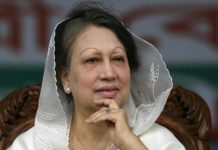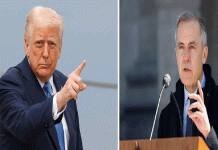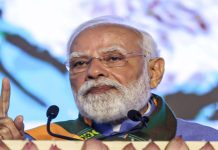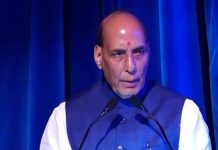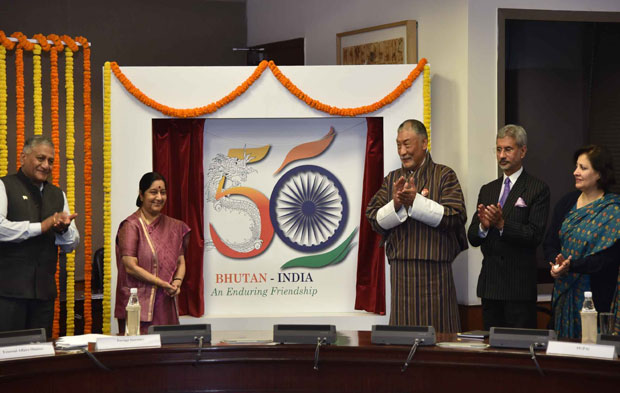Thimphu, As India and Bhutan enter their 50th year of diplomatic ties, the Ambassadors of the two countries came together on stage, sharing their understanding of the “enduring friendship” and the many factors that have strengthened it.
The Himalayan country’s Queen Mother Ashi Dorji Wangmo Wangchuk led her nation in mourning the death of former Indian Prime Minister Atal Bihari Vajpayee.
Bhutan’s annual literary extravaganza, Mountain Echoes, kicked off with an address by Wangchuk, where she mourned Vajpayee’s demise.
Speaking “with a sense of deep regret”, she described the late Prime Minister as “a dear friend of Bhutan” who will be “greatly missed” in the Himalayan nation. As a mark of respect, she led the gathering in observing a minute of silence.
Wangchuk dedicated the ninth edition of the festival to the “enduring friendship” of India and Bhutan, saying that the thriving relationship was “a matter of imense happiness and satisfaction” for the people of the two countries.
She recalled first Indian Prime Minister Jawaharlal Nehru’s historic visit to Bhutan in 1961, saying that it cemented Indo-Bhutan ties.
She added that Bhutan’s first two Five Year Plans were sponsored by India during Nehru’s term in office.
“First motorable roads, hospitals abd schools were made in Bhutan with India’s help. It was our dear friend India who sponsored Bhutan’s entry into the UN,” Wangchuk said.
She emphasised that regular exchange of high-level visits was the hallmark of the ties, mentioning the visits by successive Indian Prime Ministers, the last one by Narendra Modi in 2014 which was also his first visit to a foreign nation after assuming office.
“We look forward to Modi’s next visit sometime this winter,” she said.
Wangchuk said the annual event will be an opportunity “to reflect upon the journey of our friendship”.
In a session titled “Treasures of Friendship: 50 years of Bhutan-India ties”, Indian Ambassador Jaideep Sarkar and Bhutanese Ambassador to India General V. Namgyel shared their insights.
Sarkar said that the bilateral ties took off in the 1950s while formal diplomatic relations were established in 1968.
“It was a culmination of almost two decades of understanding between our two nations,” Sarkar said.
Namgyel provided a historical synopsis of the ties, stating that Bhutan’s foreign policy during the colonial period was to protect its sovereignty and thus Bhutanese leaders maintained good relations with the British but never allowed them to enter their territory.
With the withdrawal of the British from India in August 1947, Bhutan could look at India not only as a neighbour but as a close friend because of the shared cultural and religious heritage between the two nations, he added.
He referred to the “landmark speech” made by Nehru during his visit which continues to be a guiding principle for Indo-Bhutan ties.
In his speech, Nehru had hailed Bhutan’s sovereignty, saying the two nations should live as friendly neighbours.
“This foreign policy statement gave a sense of trust to the Bhutanese and it has been carried forward in the same spirit even today. Genuine friendship based on goodwill is the hallmark of Indo-Bhutan ties,” the Ambassador said.
Sarkar said that Indian monetary assistance to Bhutan was based on the principle of mutual understanding.
“We do not get involved in what project Bhutan should implement or not,” he said, adding that it was the prerogative of Thimpu to take decisions for itself.
“Our assistance is fully sustainable. Our intention is not to build ties of dependence but inter dependence.”
The two also exchanged their views on hydro-power projects in Bhutan which have been supported by India.
However, the 40-minute session seemed to regard China as a taboo subject.
Despite its growing implications in the national interests of both India and China, the Ambassadors did not speak a word on China.
In response to reporters question that sought Sarkar’s views on how it was possible to look at Indo-Bhutan ties without referring to China, the Ambassador, in what was a conscious effort to deflect from the question, said that Indo-Bhutan ties have many aspects, the geo-political being only one of many.
The Mountain Echoes literary festival is organised by India-Bhutan foundation and Siyahi, a Jaipur-based literary consultancy agency.


